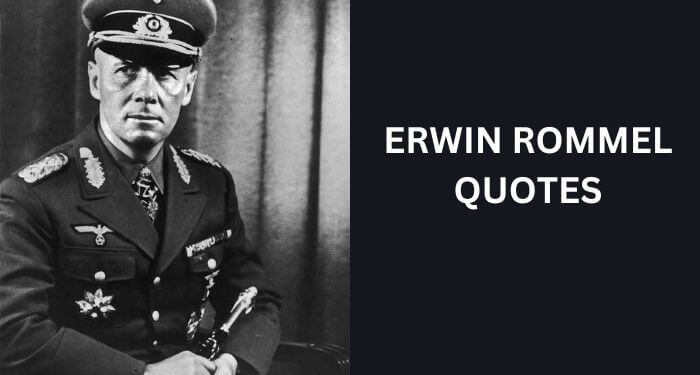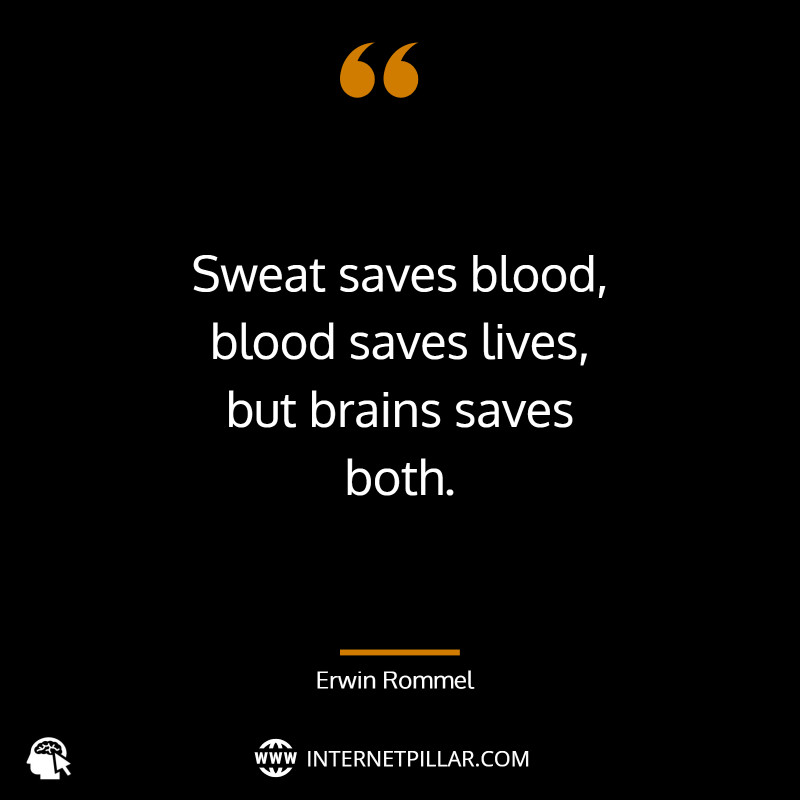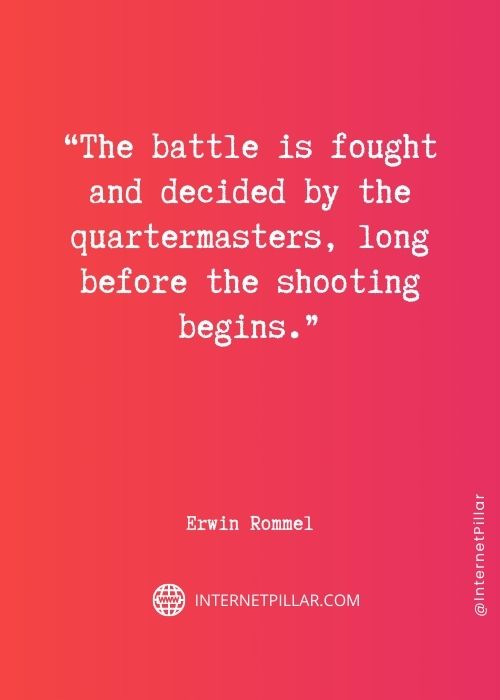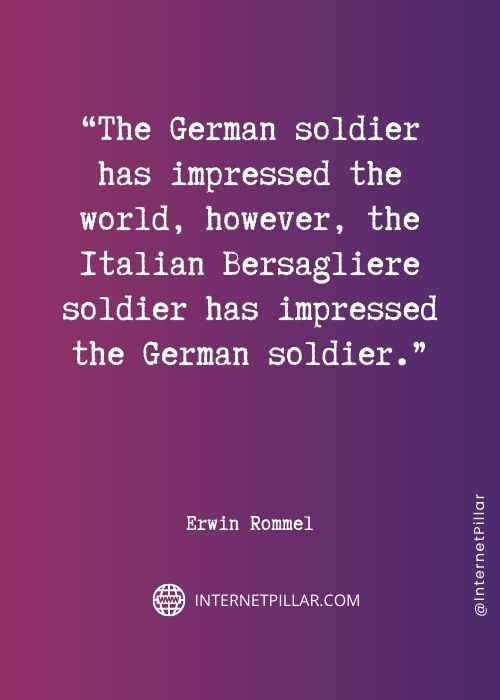Rommel, born on November 15, 1891, in Germany, joined the army in 1910 and distinguished himself in World War I.
Between wars, he met Hitler and became associated with the Nazi regime, serving in various capacities, including as a liaison to the Hitler Youth and commander of Hitler’s personal escort.
Hitler appointed Rommel to lead the 7th Panzer Division during the blitzkrieg invasion of Belgium and France.
He later commanded the Afrika Korps, earning the nickname “Desert Fox” for his strategic brilliance.

However, as the war progressed, Rommel grew disillusioned with Hitler.
Though not conclusively tied to the plot to assassinate Hitler, Rommel’s associations led Hitler to force him into suicide in 1944.
I have collected the best quotes of Erwin Rommel for you.
Inspirational Erwin Rommel Quotes

1. “Don’t fight a battle if you don’t gain anything by winning.” ~ (Erwin Rommel).

2. “A risk is a chance you take; if it fails you can recover. A gamble is a chance taken; if it fails, recovery is impossible.” ~ (Erwin Rommel).

3. “Sweat saves blood, blood saves lives, but brains saves both.” ~ (Erwin Rommel).

4. “If I had to take hell, I would use the Australians to take it and the New Zealanders to hold it.” ~ (Erwin Rommel).

5. “In the absence of orders, go find something and kill it.” ~ (Erwin Rommel).

6. “For me, soldiers are all equal. Those black people wore your same uniform, fought on your side, and so you will be in the same jail.” ~ (Erwin Rommel).

7. “It is often possible to decide the issue of a battle merely by making an unexpected shift of one’s main weight.” ~ (Erwin Rommel).

8. “Loose lips sink ships.” ~ (Erwin Rommel).

9. “Always in a moment of extreme danger things can be done which had previously been thought impossible.” ~ (Erwin Rommel).

10. “The battle is fought and decided by the quartermasters, long before the shooting begins.” ~ (Erwin Rommel).

11. “The German soldier has impressed the world, however, the Italian Bersagliere soldier has impressed the German soldier.” ~ (Erwin Rommel).
Best Erwin Rommel Quotes
12. “Winning the men’s confidence requires much of a commander. He must exercise care and caution, look after his men, live under the same hardships, and above all apply self-discipline. But once he has their confidence, his men will follow him through hell and high water.” ~ (Erwin Rommel).
13. “There is one unalterable difference between a soldier and a civilian: the civilian never does more than he is paid to do.” ~ (Erwin Rommel).

14. “I would rather be the hammer than the anvil.” ~ (Erwin Rommel).
15. “Whether I would survive a defeat lies in God’s hands. The lot of the vanquished is heavy. I’m happy in my own conscience that I’ve done all I can for victory and have not spared myself.” ~ (Erwin Rommel).
16. “Men are basically smart or dumb and lazy or ambitious. The dumb and ambitious ones are dangerous and I get rid of them. The dumb and lazy ones I give mundane duties. The smart ambitious ones I put on my staff. The smart and lazy ones I make my commanders.” ~ (Erwin Rommel).
17. “Be an example to your men, in your duty, and in private life. Never spare yourself, and let the troops see that you don’t in your endurance of fatigue and privation. Always be tactful and well-mannered and teach your subordinates to do the same. Avoid excessive sharpness or harshness of voice, which usually indicates the man who has shortcomings of his own to hide.” ~ (Erwin Rommel).
18. “One of the most important factors, not only in military matters but in life as a whole, is … the ability to direct one’s whole energies towards the fulfillment of a particular task.” ~ (Erwin Rommel).
Top Erwin Rommel Quotes
19. “Training errors are recorded on paper. Tactical errors are etched in stone.” ~ (Erwin Rommel).

20. “When there’s no clear option, it’s better to do nothing.” ~ (Erwin Rommel).
21. “The commander must be at constant pains to keep his troops abreast of all the latest tactical experience and developments, and must insist on their practical application. He must see to it that his subordinates are trained in accordance with the latest requirements. The best form of welfare for the troops is first-class training, for this saves unnecessary casualties.” ~ (Erwin Rommel).
22. “In a man-to-man fight, the winner is he who has one more round in his magazine.” ~ (Erwin Rommel).
23. “The art of concentrating strength at one point, forcing a breakthrough, rolling up and securing the flanks on either side, and then penetrating like lightning deep into his rear, before the enemy has time to react.” ~ (Erwin Rommel).
Famous Erwin Rommel Quotes
24. “Manstein is a man of illusions. … He believes Hitler will listen to facts.” ~ (Erwin Rommel).
25. “One cannot permit unique opportunities to slip by for the sake of trifles.” ~ (Erwin Rommel).

Short Erwin Rommel Quotes
26. “Mortal danger is an effective antidote for fixed ideas.” ~ (Erwin Rommel).
27. “Messages can’t be intercepted if they aren’t sent, can they?” ~ (Erwin Rommel).
28. “In Tunisia, the Americans had to pay a stiff price for their experience, but it brought rich dividends. Even at that time, the American generals showed themselves to be very advanced in the tactical handling of their forces, although we had to wait until the Patton Army in France to see the most astonishing achievements in mobile warfare.” ~ (Erwin Rommel).
29. “Give me the Maori Battalion and I will conquer the world”. ~ (Erwin Rommel).
30. “No plan survives contact with the enemy.” ~ (Erwin Rommel).
You Might Like
- Eric Andre Quotes
- Jack Welch Quotes
- Bill Gates Quotes
- Casey Neistat Quotes
- Seneca Quotes
- John Lennon Quotes
- Bryan Stevenson Quotes
- Paul Lynde Quotes
- Sylvester Stallone Quotes
- Nicki Minaj Quotes
Short Biography of Erwin Rommel
Erwin Rommel, a notable German field marshal during World War II, was famously dubbed the Desert Fox for his strategic prowess in the North African campaign.
Serving in various German armies, he gained recognition in World War I, earning the Pour le Mérite for his service on the Italian Front.
| Full Name | Johannes Erwin Eugen Rommel |
| Nickname(s) | “The Desert Fox” |
| Born | 15 November 1891 Heidenheim an der Brenz, Württemberg, German Empire |
| Died | 14 October 1944 (aged 52) Herrlingen, Gau Württemberg-Hohenzollern, Nazi Germany |
| Cause of death | Forced suicide by cyanide poisoning |
| Buried | Herrlingen cemetery |
| Allegiance | German Empire (1911–1918), Weimar Republic (1918–1933), Nazi Germany (1933–1944), German resistance to Nazism(May 1944 – October 1944) |
| Service/Branch | Imperial German Army, Reichsheer, German Army |
| Years of service | 1911–1944 |
| Rank | Generalfeldmarschall |
| Commands held | 7th Panzer Division, Afrika Korps, Panzer Army Africa, Army Group Africa, Army Group B |
| Awards | Iron Cross; First Class; Pour le Mérite; Knight’s Cross of the Iron Cross with Oak Leaves, Swords and Diamonds |
| Spouse(s) | Lucia Maria Mollin (m. 1916) |
| Children | Gertrud Stemmer, Manfred Rommel |
Rommel’s military insight was further highlighted in his book, “Infantry Attacks,” based on his experiences.
Despite his esteemed reputation and perceived chivalry, debates continue over the conduct of forces under his command, including potential war crimes during the African conflicts, although evidence directly implicating Rommel is unclear.
Quick Facts about Erwin Rommel
- Erwin Rommel was born on November 15, 1891, in Heidenheim, Germany.
- He died on October 14, 1944, in Herrlingen, near Ulm, Germany.
- Rommel became a popular German Field Marshal known for his leadership in World War II.
- Nicknamed the “Desert Fox,” he was renowned for his commanding role in the North African campaign.
- Rommel’s father was a teacher, and his mother was the daughter of a senior official.
- He joined the 124th Württemberg Infantry Regiment in 1910 as an officer cadet.
- During World War I, Rommel served as a lieutenant in France, Romania, and Italy.
- Known for his courage and leadership, he showed early signs of a promising military career.
- Rommel authored “Infanterie greift an” (Infantry Attacks), a military textbook based on his experiences.
- In 1938, he became the commandant of the officers’ school in Wiener Neustadt, Austria.
- Rommel was personally known to Adolf Hitler, initially serving as commander of the Führer’s headquarters troops.
- He assumed command of the 7th Panzer Division in 1940, despite no prior experience with armored units.
- Rommel led a successful raid on France’s Channel coast in May 1940.
- He was appointed commander of the Afrika Korps in 1941 to aid the Italian army in Libya.
- Rommel was promoted to Field Marshal by Hitler, impressed by his North African victories.
- Despite his successes, Rommel faced supply issues and recommended a withdrawal, which Hitler refused.
- In 1942, he was ordered to attack Cairo and the Suez Canal but was stopped at El-Alamein.
- Rommel’s popularity soared in the Arab world, where he was seen as a liberator from British rule.
- He was portrayed as the “people’s marshal” (Volksmarschall) by German propaganda.
- In 1944, Rommel was put in charge of defending France’s Channel coast against an Allied invasion.
- He innovatively planned coastal defenses based on his experiences with Allied air tactics in North Africa.
- Differences with his superiors over defense strategies weakened German defenses during the Normandy invasion.
- By mid-1944, Rommel doubted Germany’s war prospects and Hitler’s leadership.
- He was approached by friends in opposition to Hitler, suggesting he lead Germany post-Hitler.
- Rommel was injured on July 17, 1944, when his car was attacked by British fighter-bombers.
- Following the failed July 20, 1944, assassination attempt on Hitler, Rommel’s connections to the plotters were discovered.
- Hitler, seeking to avoid scandal, offered Rommel a suicide option to protect his family’s honor.
- Rommel took poison on October 14, 1944, as suggested, and died at home.
- He was buried with full military honors, reflecting his status and reputation.
- Rommel’s military strategies and tactics continue to be studied in military academies around the world.
Top Questions about Erwin Rommel
A: Despite lacking a military tradition in his family, the establishment of the German Empire in 1871 made a career as an army officer fashionable among middle-class southern Germans, prompting Rommel to join the 124th Württemberg Infantry Regiment in 1910.
A: Rommel earned the nickname “Desert Fox” from both his allies and adversaries due to his skillful and audacious surprise attacks in the North African desert during World War II.
A: Rommel displayed a profound understanding of mechanized and armored warfare, which was particularly notable during his command of the Afrika Korps, where he utilized these forces to great effect in offensive roles.
A: Rommel was defeated in the Second Battle of El-Alamein, leading to his eventual withdrawal to the German bridgehead in Tunis.
A: Rommel advocated for the placement of reserve forces immediately behind coastal defenses for rapid counterattacks, differing from his superiors who favored a traditional placement of reserves farther back.
A: Rommel was approached by friends within the clandestine opposition to Hitler and considered taking over as head of state post-Hitler’s overthrow, although he was unaware of plans to assassinate Hitler.
A: After a failed assassination attempt on Hitler and the exposure of Rommel’s contacts with the conspirators, Rommel was coerced into taking poison by generals sent by Hitler, promising to protect his family’s name in exchange.
A: Rommel began his military career in 1910 by joining the 124th Württemberg Infantry Regiment, and he first saw combat as a lieutenant during World War I, fighting in France, Romania, and Italy.



